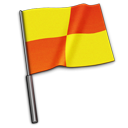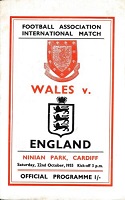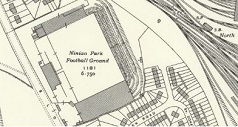|
|
 flg.jpg) "Soccer
Savagery"
Daily Mirror "Soccer
Savagery"
Daily Mirror |
  Officials
from Northern Ireland Officials
from Northern Ireland |
Wales |
UK ruling on substitutes |
England |
Referee
Thomas James
Mitchell
43 (28 January 1912), Lurgan, Ulster |
"The selectors have
proved themselves the master publicists of fossilised football."
Daily Mirror, Wednesday, 12 October
1955 |
|
red flag
Linesmen
yellow flag |
W.
Williams
Belfast |
W.G. Strange
Carnmoney |
|
|
|
 Wales
Team Wales
Team |
| |
|
Rank |
No official ranking system established;
ELO rating 28th to 23rd |
Colours |
Made by Umbro -
Red jerseys with white collars/cuffs, white shorts
with red side stripe, red socks with white tops. |
|
Captain |
Alf Sherwood |
Selection |
International Selection Committee, on Tuesday, 11
October 1955 |
|
Trainer: E. Nash (Cardiff City FC) |
 Wales
Lineup Wales
Lineup |
|
|
Kelsey, A. John |
25
337 days |
19 November 1929 |
G |
Arsenal FC, England |
6 |
11ᵍᵃ |
|
2 |
Williams, Stuart G. |
25
105 days |
9 July 1930 |
RB |
West Bromwich Albion FC, England |
4 |
0 |
|
3 |
Sherwood, Alfred T. |
31
343 days |
13 November 1923 |
LB |
Cardiff City FC |
36 |
0 |
|
4 |
Charles, Melvyn |
20
161 days |
14 May 1935 |
RHB |
Swansea Town FC |
2 |
0 |
|
5 |
Charles, W.
John |
23
299 days |
27 December 1931 |
CHB |
Leeds United AFC, England |
14 |
10 |
 |
the 19th own goal scored for England |
|
|
|
|
|
6 |
Paul, Roy |
35
187
days |
18 April 1920 |
LHB |
Manchester City FC, England |
30 |
1 |
7
  |
Tapscott, Derek.R |
23
114 days |
30 June 1932 |
OR |
Arsenal FC, England |
6 |
1 |
8
 |
Kinsey, Noel |
29
302 days |
24 December 1925 |
IR |
Birmingham City FC,
England |
6 |
0 |
|
9 |
Ford, Trevor |
32
21 days |
1 October 1923 |
CF |
Cardiff City FC |
34 |
23 |
|
mst goals |
|
10 |
Allchurch, Ivor J. |
25
310 days |
16 December 1929 |
IL |
Swansea Town FC |
22 |
8 |
11
 |
Jones, Clifford W. |
20
257 days |
7 February 1935 |
OL |
Swansea Town FC |
2 |
1 |
|
reserve: |
Derrick Sullivan (Cardiff City FC) |
|
team notes: |
Cliff Jones is the son of Ivor, who also played for
Wales against England, in 1921,
and scored in the 1923 match.
The Charles' are brothers. |
|
records: |
This is Wales' first victory over England for seventeen years (1938),
which was also the last time Wales had scored twice in the first half
against England. |
|
|
|
2-3-5 |
Kelsey
-
Williams, Sherwood -
M.Charles, J.Charles,
Paul -
Tapscott, Kinsey, Ford, Allchurch, Jones |
|
Averages: |
Age |
26 years 289
days |
Appearances/Goals |
14.7 |
3.8 |
|
|
|
flg.jpg) England
Team England
Team |
| |
|
Rank |
No official ranking system established;
ELO rating 6th |
Colours |
The 1954 Umbro
home uniform -
White v-necked short-sleeved continental jerseys, blue shorts, black
socks with white tops.
|
|
P seventh of 43, W 3 - D 1 - L 3 - F 18 - A 12. |
|
Captain |
Billy Wright  ³ ³ |
Manager |
Walter Winterbottom, 42 (31 March 1913), appointed as FA national director of coaching/team manager on 8 July 1946; |
|
record 55th of 90, W 31 - D 10 - L 14 - F 136 - A 87. |
P 73rd of 139, W 44 - D 14 - L 15 - F 210 - A 108,
one abandoned. |
|
|
Teams chosen in Bristol by Selection Committee, headed by Joe Mears, on Wednesday evening, 12
October, following the FA XI match with the RAF XI. |
flg.jpg) England
Lineup England
Lineup |
|
|
three changes
to the previous match (Williams,
Matthews & Wilshaw>Baynham, Milburn & Bradford) |
league position
(12 October) |
|
|
|
Williams, Bert F. |
35
264 days |
31 January 1920 |
G |
Wolverhampton Wanderers FC
(FL 11th) |
24 |
34ᵍᵃ |
|
final app
1949-55 |
|
2 |
Hall, Jeffrey J. |
26
45 days |
7 September 1929 |
RB |
Birmingham City FC (FL 12th) |
2 |
0 |
|
3 |
Byrne, Roger W. |
26
44 days |
8 September 1929 |
LB |
Manchester United FC
(FL 3rd) |
15 |
0 |
|
4 |
McGarry, William H. |
24
134 days |
10 June 1927 |
RHB |
Huddersfield Town AFC
(FL 19th) |
4 |
0 |
|
final app
1949-55 |
|
5 |
Wright, William A. |
31
258 days |
6 February 1924 |
CHB |
Wolverhampton
Wanderers FC (FL 11th) |
70 |
3 |
|
most apps
1952-55 |
|
6 |
Dickinson, James
W. |
30
181 days |
24 April 1925 |
LHB |
Portsmouth
FC (FL 8th) |
42 |
0 |
|
7 |
Matthews, Stanley |
40
263 days |
1 February 1915 |
OR |
Blackpool FC
(FL TOP) |
46 |
9 |
|
oldest outfield player |
|
8 |
Revie, Donald G. |
28
104 days |
10 July 1927 |
IR |
Manchester City FC
(FL 13th) |
5 |
4 |
|
9 |
Lofthouse, Nathaniel |
30
56 days |
27 August 1925 |
CF |
Bolton Wanderers FC
(FL 6th) |
28 |
27 |
|
10 |
Wilshaw, Dennis J. |
29
225 days |
11 March 1926 |
IL |
Wolverhampton Wanderers FC
(FL 11th) |
8 |
7 |
|
11 |
Finney,
Thomas |
33
200 days |
5 April 1922 |
OL |
Preston
North End FC (FL
14th) |
57 |
24 |
|
reserve: |
Joe Kennedy (West Bromwich Albion FC
(FL 2nd)). |
|
team notes: |
On 12 October 1955, the Selection Committee chose another two teams,
as well as this one, the others being the Football League side against
Scottish League at Hillsborough on 26th, and the fifteen-man party
from which the British Olympics team will be chosen against Bulgaria
on 23rd. |
|
pre-match: |
This senior side trained against and beat the B team 4-1 under
floodlights on Monday, 17th, at the Cliff Ground, Broughton in
Manchester. On the Tuesday, they trained with the Everton FC side and
lost 3-1 in the fifty-minute practice match. |
|
records: |
Billy Wright extends his record appearance tally, in his record 35th
consecutive match. |
|
After watching the B team
beat Yugoslavia, they set up in Porthcawl. |
|
|
|
2-3-5 |
Williams -
Hall, Byrne -
McGarry, Wright, Dickinson -
Matthews, Revie, Lofthouse, Wilshaw, Finney. |
|
Averages: |
Age |
30 years 363
days |
Appearances/Goals |
27.4 |
6.7 |
|
oldest post war team
so far |
|
|
|
|
Match Report
by Mike Payne |
|
 It
was 17 years to the day that Wales last tasted victory against the old
enemy from England and when this game began there seemed to be no hint
that that record would be improved. It
was 17 years to the day that Wales last tasted victory against the old
enemy from England and when this game began there seemed to be no hint
that that record would be improved.
Stan Matthews and Tom Finney quickly got into their stride, causing
Sherwood and Stuart Williams several anxious moments. In one incident even
Ford was seen to tackle Matthews deep in the Welsh half, such was the
pressure. Gradually, though, the home defenders began to take control and,
as the game progressed, less was seen of the two England wingers. Mel
Charles began to dominate the midfield and, with his brother John Charles
showing immense stature at the back, Wales looked more and more composed.
Ford almost scored when he headed
just over and then the centre-forward was caught narrowly offside after
Kinsey delayed his pass a fraction too long. The Welsh pressure was
increasing all the time now and Kelsey was often the only man in his own
half. Eventually the attacking paid off explosively with Wales scoring two
goals within sixty seconds.
Thirty-eight minutes had gone when
hesitancy in the England defence allowed Tapscott to run on to Kinsey's
through pass before striking a rising shot high into Bert Williams' net.
The ecstatic crowd hardly had time to settle before the England
goalkeeper was again picking the ball out of the net. This time Cliff
Jones met a centre by Paul perfectly to head home a stunning goal. The
noise from the crowd was deafening and at half-time they gave their team a
wonderful ovation as they left the pitch. Even the dogs that performed
for the crowd during the break seemed to have an extra spring in their
step.
Six minutes after the restart that same crowd were stunned
into silence as England pulled a goal back in the strangest of
circumstances. A long, harmless-looking lob by Roger Byrne into the Welsh
penalty area seemed to be of no danger to their defence, but inexplicably
John Charles leapt and planted a superb header wide of his own startled
'keeper. The strange thing was that it looked so intentional.
Luckily, from Charles' viewpoint, the goal did not matter in the final
analysis. England had most of the play during this half but lacked the
necessary thrust up front. Wales were hampered by an injury to Paul but
only once did England nearly score. That came when Don Revie brilliantly
back-heeled on the volley a centre by Finney, only for the ball to rebound
off the crossbar. The last quarter of an hour was untidy and full of
niggling incidents, but in the end Wales just about deserved their famous
victory.
|
|
Match Report
by Norman Giller |
|
Wales conquered England for the first time
since 1938 thanks to a headed winning goal from young Swansea winger Cliff
Jones, whose Uncle Bryn had scored
one of the four goals that beat England seventeen years earlier.
England's high-powered attack floundered against a Welsh defence in which
the Charles brothers, John and Mel, played side by side. The game was
virtually settled in a two minutes spell just before half-time. Derek Tapscott
took advantage of hesitancy in the England defence to shoot Wales into the
lead, and then Cliff Jones made it 2-0 with a stunning header from a Roy Paul
cross. The only time England got the ball into the net was when John Charles,
trying to clear his lines in the fifty-first minute, turned the ball past
brilliant Arsenal goalkeeper Jack Kelsey for a spectacular own goal.
|
|
Match Report
as appears in the F.A. Yearbook 1956-57 pages 28-29 |
|
Played at Cardiff on October 22nd
before 55,000 spectators, Wales were the winners after a hard fight. It
was a grand, even game for the first half-hour, with the Welsh team
playing with great fire and vigour. Then in the 38th minute Tapscott
and Jones scored twice for Wales, the second after a fine run and accurate
long pass by Paul. Soon after half-time John Charles headed a long centre
from Byrne into hos own net, the only mistake he made in a great display;
but England's forwards, despite continuous pressure, were not quite good
enough to force an equaliser.
This England team was largely based on
the team that beat Denmark.
|
|
In Other News.... |
|
It was on 22 October 1955 that the bodies of 21-year-old
Oxford University student, John Downey, and his
twenty-year-old fiancée, Joan Williams, who was a typist, were
found in the Leeds and Liverpool Canal at Litherland, five
miles from Liverpool. They had both drowned after going for a
walk, eight days earlier, prior to Downey leaving for a
three-month languages course in Paris. The coroner recorded an
open verdict, three days later, and it remains a mystery as
to how they both ended up in the water. |
|
Aberdeen beat St Mirren, 2-1 at Hampden Park, Glasgow to win
the Scottish League Cup for the first time. |
|
|
|
|
|
|
Source Notes |
TheFA.com
Original newspaper reports
The Complete Book of the British Charts
Wales' Complete Who's Who
since 1946 |
|
Rothman's Yearbooks
Mike Payne's England: The Complete Post-War Record
Norman Giller, Football Author
British Pathé |
|
|
cg |

